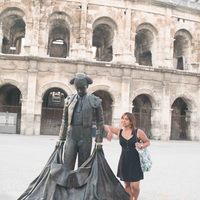Sukanya Raisharma
University of Oxford, History, Graduate Student
- D. Phil Candidate, Faculty of History, University of Oxford. Funded by St John's College, Oxford and Arts and Humanit... moreD. Phil Candidate, Faculty of History, University of Oxford. Funded by St John's College, Oxford and Arts and Humanities Research Council (AHRC)
Graduate Teaching Assistant, Language and Literature, Faculty of Classics, Oxford
Teaching Team, OxLat Project, Faculty of Classics, Oxford https://www.humanities.ox.ac.uk/article/classics-faculty-celebrate-excellent-outcome-oxlat-teaching-scheme
Architectural Documentation of Casa di Arriana, Pompeii (Austrian Archaelogical Institute), April-May 2020 (projected)
Archaeological Field Work in Aeclanum (Apolline Project), July 2019 and in Pausilypon (University of Bologna), September 2019 (projected)
Ethnic Minorities Liaison Officer, Women’s Classical Committee, School of Advanced Study, London, 2017 - present
Junior Teaching Fellow, Ashmolean Museum Teaching Scheme, January 2018 - March 2018
Oxford-Padua Erasmus Exchange, March 2017 – August 2017: awarded Erasmus scholarship to study in the University of Padua, Italy (declined)
Student at Accademia Vivarium Novum, Rome, June 2015 - August 2015; October 2015 - November 2015
Assistant to Victoria Zimmerl-Panagl, Corpus Scriptorum Ecclesiasticorum Latinorum, 'Kollationierung des ersten Buches von Ambrosius, De Virginibus, in den Handscriften Mainz, II, 65 und Göttweig, 94', July 2014 - December 2014
Project Member, Institut für Mittelalterforschung, Vienna, Award from the Austrian Academy of Sciences for the project, ‘Visions of Community Comparative Approaches to Ethnicity, Region and Empire in Christianity, Islam and Buddhism (400-1600 CE)’, October 2013 - December 2014
M.A. (Medieval and Renaissance Studies), University College London. Funded by Graduate Bursary Scheme
Affiliated B.A., University of Cambridge (English Language and Literature). Scholarship from Cambridge Commonwealth Trust
B.A., University of Delhi. Scholarship from Sumitomo-Sakura Bank, Japanedit
